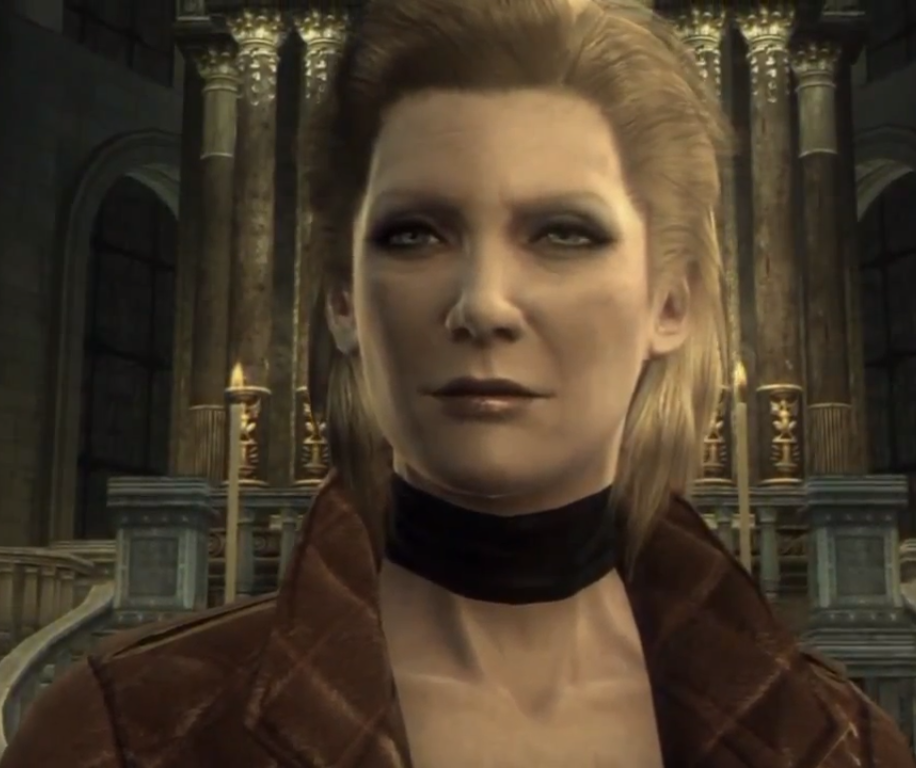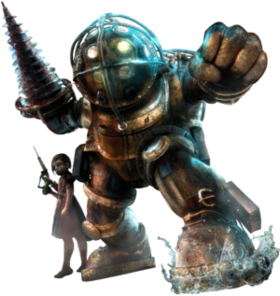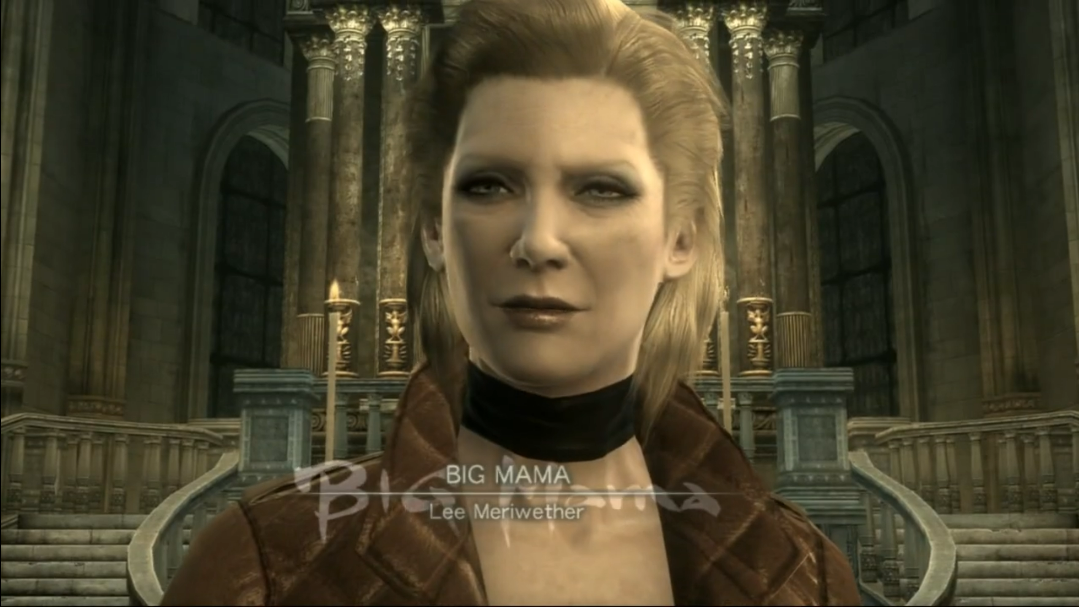Crossing Eden
Hello, my name is Yves Guillemot, Vivendi S.A.'s Employee of the Month!
EDIT:Instead of rushing to respond only to the title and find what you perceive to be an exception to all the tropes in the articles, actually read it, because your example has probably already been mentioned.
Omitted a lot of examples from the article to give incentive to read it. http://www.polygon.com/features/2016/7/7/12025874/where-are-the-video-game-moms
I've actually been thinking about this lately so it's good to see someone point it out with various examples.
While dads are everywhere in games, mothers are almost invisible
We've heard a lot about the dadification of videogames. The recent E3 games convention showed the likes of Kratos, Marcus Fenix and Corvo joining Booker DeWitt, Joel and Ethan Mars as tender-but-tough paragons of fatherhood.
So where are the heroic moms?
Game development teams — very often led by middle aged men — are happy to churn out fictional models of brooding, paternal excellence. But they take a very different approach to depicting motherhood.
Polygon looked at a selection of more than 40 recent or recent-ish games featuring moms and mom stories, representing a cross-section of story-based games covering the last decade or so.
We found that gaming generally treats moms as background narrative props for protagonists, very often dead or absent. Sometimes, older women with children are presented as anti-moms, whose quest for power concludes with sentiments of regret generally absent from games in which male villains are vanquished. Those women who are portrayed as positive mother figures are often not actual mothers at all.
LONG DEAD MOMS
The most common state for a mother in games, is to be dead. Deaths often occur in childbirth or the early childhoods of protagonists.
Ellie's mother Anna, in The Last of Us, dies soon after childbirth. She serves in the game as an inspiration to Ellie, through letters. This is a common device in games, with dead moms showing up via ancient correspondence or as ghosts and spirits
In The Legend of Zelda: Ocarina of Time, Link's mother is a fighter in the Hyrulean Civil War, who delivers her child to an ancient tree for safekeeping before expiring from wounds. When Link is told the story of his mother, it serves as an inspiration to complete his quest.
NARRATIVE USEFULNESS
The Uncharted series' treasure hunter Nathan Drake's mother was a historian who committed suicide while he was still a child. It is said that she suffered from depression. Once again, mother serves to create a narrative link between the protagonist and the danger of his work.
Margie Jensen is the adoptive mother of Deus Ex's Adam Jensen, who exists in a dysfunctional urban society beset by challenges created by technology. She is absent from his life. We know that she was unable to have her own baby, is addicted to antidepressants and lives in Detroit. The links are manifold.
Leandra Arnell is the mother of protagonist Hawke in Dragon Age 2. She is murdered by a serial killer, briefly returns as a reanimated monster, and, once safely dead, appears as a ghost to tell her son she's proud of him. Apart from being dead, expressing pride is a mom's main function in games. With Leandra, we got both.
SEX WORKERS AND WILD WOMEN
Video gaming's weird obsession with childbirth, death and corruption is given full flight in Bloodborne when a character called Arianna, Woman of Pleasure, who describes herself as "a whore," gives birth to a monster, which the player is obliged to kill. Arianna also appears to expire.
Prostitution crops up here and there in mother stories. In Heavy Rain, Lauren Winter is a sex worker whose child is murdered by a serial killer.
MARITAL PROBLEMS
GTA publisher Rockstar gave us another grotesque mother in Bully. The unnamed mother drops Jimmy off at boarding school before departing on a year-long honeymoon with her fifth husband. She is a selfish and mean woman, a classic fictional Bad Mother.
The marital difficulties of parents are sometimes used as a backdrop for game tales, usually in more sophisticated storytelling settings. In Gone Home, both parents are away at a retreat when Kate returns home. As the player investigate the house, it emerges that Kate's ecologist mom Jan has been considering an affair with a co-worker, but has drawn back.
Life is Strange's Joyce Price is the mother and Chloe. She is wise and kind, even though she's had it rough. She works as a waitress in a small town diner and is married to a difficult man. Despite having little freedom of her own — her life in the game is mostly shaped around her daughter's concerns — she's a convincingly portrayed person who does her best in difficult circumstances. Price is a rare example of a real world video game mom who is alive and seemingly admired by all.
MOMMY'S DEATH SAYS GO
At least these women are extant in the stories in which they focus. The death of a mother serves as the principal catalyst in games like Far Cry 4, in which Ajay travels to the Himalayan country of Kyrat to honor his mother's last wishes, and spread her ashes in her homeland.
In Final Fantasy 13, playable character Hope watches as his mother is killed during a rebellion
POSITIVE MOMS … NOT REALLY
There are other examples of positive and powerful role models who are also mothers. Sheperd's mom in the Mass Effect series is an admiral, though we only encounter her through letters to her child, in which she states the usual maternal pride.
Interestingly, positive mothers are often not actually mothers at all. In The Witcher 3, Geralt love-interest Yennefer of Vengerberg is ward to special child Ciri, and a highly capable sorcerer.
Mother Giselle in Dragon Age: Inquisition is a beloved, brave and generous older woman who displays all the qualities of idealised motherhood, but she is a cleric, not a biological mother, so far as we know.
Bayonetta is that very rare character, a mother who is also a player-character. She is a reluctant ward to Cereza. But it turns out that, via some time paradox shenanigans, Cereza is Bayonetta at a younger age.
ABSENT MOMS
These stories of mothers demonstrate that gaming generally treats moms as cardboard cut-outs whose only function is to create narrative space for protagonists.
Of course, orphans are a staple of fiction, allowing characters the space to define themselves separately from parental expectation. It's something of a cliche, most especially in children's fiction in which the protagonist becomes powerful. Think Harry Potter, Tarzan and Superman. In games, control, power and individuality are especially important. But their overwhelming presence in games smacks, not merely of bias, but of a lack of imagination and an inability to confront tired ideas.
In games, mothers are almost never playable characters. One of the few exceptions to this is the as-yet unreleased game Thralled, about a slave trying to escape to freedom, while keeping her baby alive.
Gaming is not alone in portraying mothers negatively. From fairy tales to Game of Thrones and TV's Mom, we've seen wicked or crappy mothers. We've also seen a lot of treacly idealized mothers over the years. Other mediums manage to create great stories out of bad moms and good moms. But gaming has so far failed to offer a range of perspectives on motherhood, that sit far outside issues of absence or neglectfulness.
Meanwhile, game developers often celebrate fathers as strong, powerful and morally upstanding, while also offering a broader range of adult male characters that take in the entire spectrum of hero, anti-hero, incompetent and villain.
Game companies are overwhelmingly staffed by men. Despite the recent splurge of hero parents at E3, there's little sign of mothers getting a fair portrayal.
But as gaming becomes increasingly diverse, perhaps we'll see improvement in the years ahead.
Omitted a lot of examples from the article to give incentive to read it. http://www.polygon.com/features/2016/7/7/12025874/where-are-the-video-game-moms
I've actually been thinking about this lately so it's good to see someone point it out with various examples.











